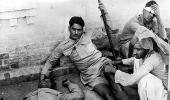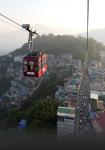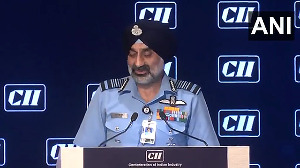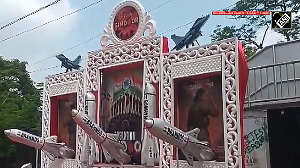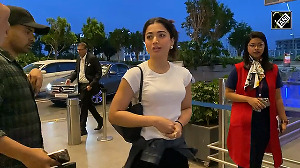'We wouldn't have had to face all this had our national leaders taken care to select a place for Sindhis and sent us there, instead of sending us all over to settle in places where the locals didn't want us.'
'They could have partitioned Sindh and given us a Sindhi state from its two Hindu-majority districts.'
'Wasn't that the logic of Partition?'
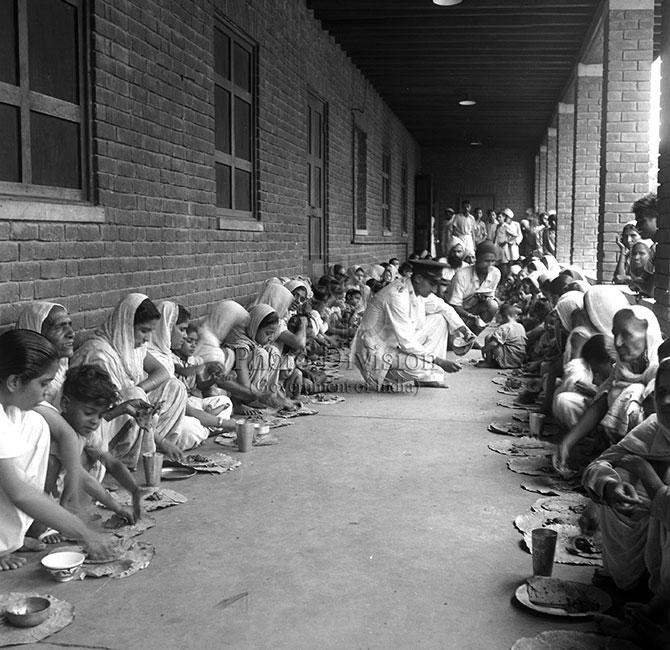
Sindhis in Kolhapur?
Not many Sindhis know that members of their community have for decades been running one of the largest markets in Maharashtra, the Gandhinagar market in Kolhapur. The historic city does not feature in Wikipedia's list of places where Sindhis migrated after Partition.
Hence, film-maker Sushil Gajwani's book Sunrise over Valivade comes as an eye-opener even to members of this tiny community that numbers 2.7 million in India. This slim book, an account of his childhood in a refugee camp in Valivade village near Kolhapur, is a never-before told story of a community that's been largely ignored in Partition literature.
Valivade recently made news when Prime Minister Narendra Modi visited Warsaw and paid homage at the Kolhapur memorial there.
The memorial pays tribute to the Valivade refugee camp that sheltered 5,000 Polish refugees during World War II. The Maharaja of Jamnagar had extended his hospitality to them, and they were housed in settlements in Jamnagar and Valivade.
However the fact that 3,000 Sindhis made this same camp home just two years after the Poles left, remains unknown in India.
Born in this refugee camp, 68-year-old Sushil Gajwani is primarily a Marathi filmmaker. Eleven of his films are in Marathi, one in Sindhi. Here he talks to Jyoti Punwani about why he felt compelled to write this account, as well as about his dual Sindhi-Marathi identity.
Why did you write this book?
Valivade is where I was born and spent my childhood; Kolhapur is where I went to school and college. The experiences of living as a refugee, good and not so good, stayed with me. They left an impact on me, in fact they moulded me.
I've read a lot: Marathi books, Leon Uris' Exodus. It often occurred to me: Why haven't such books be written on Sindhis? Of course, there have been some wonderful writers of late, but what I experienced as a Sindhi child in a Marathi-speaking community was unique.
You lived as a joint Sindhi family in one building in Kolhapur, surrounded by a completely different culture. How much of that Sindhi culture has stayed with you? What about your children?
I'm absolutely into Sindhi culture -- but also into Marathi culture. I consider myself both Sindhi and Marathi. Both Sindhi and Marathi are my mother tongues.
How can Marathi be your mother tongue?
I'm a Sindhi mother's child, and I heard Marathi from the moment I was born. That's the reason I've made so many Marathi films and written articles in Marathi. In fact, after some years, even the women in our family started to speak Marathi.
My children, like me, speak Sindhi and Marathi. We love the traditional Sindhi food I grew up eating at home, but we also love Poha and other Marathi dishes.
The word 'Nirvashya' features as an important theme in your book. What exactly does it mean and why did it make Sindhis, including you, react so violently?
As I've said in the book, 'Nirvashya' means homeless, but not in a good way. The way it was said 'Ey Nirvashya' -- it was a taunt thrown at us. It made us angry because we had not come as refugees out of choice. Politics had forced us to leave our homes and our lands.

You even abused a cop who addressed you with that taunt, which earned you a beating and a night in the lock up. You've written that such experiences turned you into an aggressive person. Were you a mild person before this?
I thought I was a very quiet person! But these confrontations changed me. Though nobody liked being taunted like that, many didn't react. But I did.
Yes, I had to spend a night in the lock up, but I'm not sorry about how I reacted. Had we quietly accepted that word, they would have used it much longer.
Those early years were difficult. At first, we were seen as Muslims, given our appearance and attire. Then when they saw us going to the temple, they realised we were Hindus. Even then, it took them time to accept us.
However, I must emphasise that the locals in Kolhapur were very generous. As I've said in the book, Chhatrapati Rajaram Maharaj, the then ruler of Kolhapur, welcomed the Sindhis with a hot meal when they arrived at the camp on November 28, 1948. And his descendant, Kolhapur MP Shahu Chhatrapati, has sent me a letter praising my book.
The negative instances were exceptions, but they are the ones that have remained with me.
See, we wouldn't have had to face all this had any of our national leaders taken care to select a place for Sindhis and sent us there, instead of sending us all over to settle in places where the locals, naturally, didn't want us. They could have partitioned Sindh and given us a Sindhi state from its two Hindu-majority districts. Wasn't that the logic of Partition?
Or they could have made Kutch into a state for Sindhis.
Gandhi would have listened to our leaders had they asked for this. But they didn't. I blame our Sindhi leaders.

This bitterness towards the leaders of those days, including Nehru, is a recurring theme in your book. Was that a widespread feeling among Sindhis?
Yes, ask any Sindhi. In my family, my grandfather would always talk bitterly about Nehru and Jinnah causing Partition. My older chachas too were bitter. Not my father, though -- he was only concerned about earning a living so that he could look after the family. His mother had taught him never to be live off charity. He, like all Sindhis, had tremendous self-esteem.
The bitterness was understandable. It was so unfair to deny us a place of our own, and give away entire Sindh to Pakistan.
India is not complete without Sindh. The very name India comes from the river Sindhu/Indus. And Sindh was no longer in India!
To a trader community it doesn't matter much, they are interested in selling and buying. But as an artist, you feel you should have your own state.
Imagine, if Sindhis had their own state, we would have had our own theatres, our readers, our own awards. We would have had our own chief minister, our own ministry of culture. We wouldn't have had to struggle to get our language included as an official language as late as 1967.
The martyr Hemu Kalani, who, though just 20 years old, preferred to be hanged rather than betray his fellow freedom fighters, wouldn't have been left out of texts on the freedom movement.

But there have been prominent Sindhis. L K Advani, Govind Nihalani, Sadhana, these are all big names.
But have they ever identified as Sindhis? In fact, in one interview, Ramesh Sippy even said he didn't know who Jhulelal (the Sindhis' deity) was! His serial Buniyaad was based on Partition, but there was no Sindhi refugee in it.
Perhaps they didn't want to identify as Sindhis because of the negative image that Sindhis had after Partition.
Wasn't it their duty as artists to dispel this wrong image? When there was a petition to remove Sindh from the National Anthem, did they take a stand?
I wrote a piece in Marathi then.
But the positive side of not having a state is the way Sindhis assimilated all over India.
Yes, it's amazing the way we assimilated. I could do a radio show on FM in Hindi for nine years, every evening for four hours, thanks to the newspaper Pudhari.
But not everyone could assimilate. My grandparents, for instance, couldn't ever get used to life in the camp and then in Kolhapur, despite the locals being wonderfully generous and helpful.
What do you feel about Partition?
Partition should never have happened. We are the same people, we share the same culture. Sindhi's greatest poets are Shah Abdul Latif, Sachal Sarmast and Sami. The first two are Muslims.

You've written about having been denied representation on your university cricket team because you were a Sindhi. You know this for a fact?
Yes, though I can't prove it.
It's the same reason that I was never considered for a film award, not even when I made the film Mulgi Jhali Ho in 1985, based on the famous song by feminist writer Jyoti Mhapsekar. It was already a very popular street play. My film had Shreeram Lagoo and Suhas Joshi in it. It deserved an award. But a colleague told me that a Gajwani would never get an award for a Marathi film.
I'm a trained director who's made a good film. Why should I be denied my due?
You've been very candid about certain incidents in which your family members committed what can only be termed as offences. I know that you are simply relating what happened, but these incidents do come across as shocking.
I'm telling a story of what actually happened.
But I feel you can't regard what these men did as 'offences'. They couldn't just keep quiet in the face of bullying. They couldn't make their families suffer.
First of all, they'd been forced to leave prosperous lives; then everything had been taken away from them on their way to India. It's not as if they chose to come here empty-handed. They did what they did out of compulsion.

Well, these instances do make the community seem very aggressive.
I'm glad they come across as aggressive. I feel there's been too much of this 'folded-hands-Hari-Om-Saeen' attitude. Yes, Sindhis come from the land of Sufis, but we can't accept injustice.
What these Sindhis did was a response to Partition, to being turned into homeless persons, into refugees for no fault of theirs. Hindus and Muslims got along in Sindh, it was the Muhajirs who came and spoilt the atmosphere. We never wanted Partition.
But I would hope my book is taken as I had intended: As a story of the great indomitable human spirit to survive, when you are pushed against the wall.
The book is also intended to be about the great Marathi-speaking community who welcomed us despite not knowing us at all. It's about Kolhapur, a lovely place, which I'm proud to call my home. Kolhapur is my homeland now.
Feature Presentation: Aslam Hunani/Rediff.com


